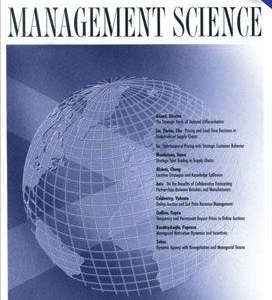
\van Leeuwen\, B., Noussair, C., Offerman, T., Suetens, S., \van Veelen\, M. and \van de Ven\, J. (2018). Predictably angry-facial cues provide a credible signal of destructive behavior Management Science, 64(7):3352--3364.
-
Affiliated authors
-
Publication year2018
-
JournalManagement Science
Evolutionary explanations of anger as a commitment device hinge on two key assumptions. The first is that it is predictable, ex ante, whether someone will get angry when feeling that he or she has been badly treated. The second is that anger is associated with destructive behavior. We test the validity of these two assumptions. We collected photos of responders in an ultimatum game before they were informed about the game that they would be playing, and we filmed responders with webcams during play. We then showed pairs of photos consisting of one responder who rejected and one responder who accepted (a low offer) to an independent group of observers. We find that observers are better than chance at detecting who rejected the low offer; they do 10% better than random guessing would. We also find that anger at receiving a low offer is associated with rejection.